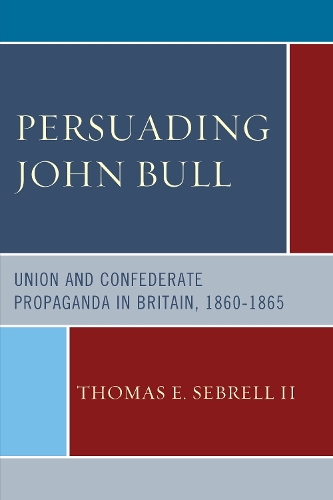
Persuading John Bull: Union and Confederate Propaganda in Britain, 186065
(Hardback)
Available Formats
Publishing Details
Persuading John Bull: Union and Confederate Propaganda in Britain, 186065
By (Author) Thomas E. Sebrell
Bloomsbury Publishing PLC
Lexington Books
30th July 2014
United States
Classifications
Professional and Scholarly
Non Fiction
Early modern warfare (including gunpowder warfare)
History of the Americas
973.7
Physical Properties
Hardback
254
Width 162mm, Height 236mm, Spine 22mm
513g
Description
This is the first scholarly analysis of The London American, the pro-Union propaganda journal published in London during the American Civil War, and the motives and troubles of its proprietor, John Adams Knight, a Northern American based in the British capital. The newspapers successes and failures in attempts to manipulate British public opinion during the war are compared with that of The Index, its rival Confederate propaganda weekly headquartered two doors down Londons Fleet Street. Persuading John Bull provides scholars and general readers alike a far greater understanding of the largely unknown Northern newspapers motivations and campaigns during the war, as well as an in-depth analysis of The Index which builds greatly on present historiographical discussions of the Southern journal. It also offers new insights into Britains roles in the conflict, Anglo-American relations, and mid-Victorian British political and social history. The book is not restricted to discussing the two propaganda machines as its focusthey are used to approach a greater analysis of British public opinion during the American Civil Warboth journals were strongly associated with numerous key figures, societies (British and American), and events occurring on both sides of the Atlantic pertaining to the conflict. Although propaganda is only one source from which to tap, the effectiveness of the two lobbyist journals either directly or indirectly impacted other factors influencing Britains ultimate decision to remain neutral. This book reveals a fresh new cast of Union supporters in London, in addition to more Confederate sympathizers throughout Britain not previously discussed by scholars. The roles of these new figures, how and why they endorsed the Northern or Southern war effort, is analyzed in detail throughout the chapters, adding greatly to existing historiography.
Reviews
During the Civil War, Britain faced a conundrum: a major sector of the British economy was dependent on cotton from the Southern states, but the British deplored slavery. Official recognition of the Confederacy by Great Britain would have provided valuable backing against the Union. There was no clear response available to Parliament, according to Sebrell. In London, pro-Union and pro-Confederate newspapers edited by Americans avidlyand sometimes clumsilycirculated propaganda, seeking public support. John Adams Knight ran the pro-Union London American; Henry Hotze created and ran The Index, which promoted the Confederacy and was largely funded by that government. Sebrell compares the efforts, circulation, and readership of these publications. Hotzes warnings that the US had designs on Canada were undermined by his ham-fisted attempts to justify slavery, and while Parliament debated the issue, the Union began to construct ironclad ships superior to Britains, creating a further deterrent to British recognition of the Confederate States. The British could no longer afford the possibility of war with the US. This well-researched book addresses an aspect of the Civil War generally overlooked. Summing Up: Recommended. Lower-division undergraduates through faculty; general readers. * CHOICE *
[H]is research is sound and the conclusions he draws . . . are persuasive. * America's Civil War *
[This book] affords a degree of fresh insight by focusing on the efforts of two periodicals that were especially vested in the outcome of the conflict the London American, a pro-Union newspaper, and The Index. . . .Persuading John Bull represents the most comprehensive study of Union and Confederate propaganda to emerge in recent years and readers will find in it much of interest. . . .Historians of Anglo-American relations and of the global connections of the Civil War more generally will undoubtedly find this book a welcome addition to the burgeoning literature on British public opinion . . . it will also serve to increase awareness of the Index and the London American as valuable historical resources and inspire further interrogation of the many themes that arise in their coverage of the conflict. * Reviews in History *
Persuading John Bull offers a detailed, clear, and thoughtful examination of an intriguing episode in northern and southern propaganda efforts in Britain. Particularly in its coverage of The London American and The Index, it enriches our understanding of Anglo-American relations, broadly construed, during the Civil War. The author has original insights to share even when covering ground familiar to specialists. -- David Prior, Indiana University
This book furthers our understanding of the transatlantic nature of the American Civil War. Dr. Sebrell offers a thorough examination of the sources that explain the moves made by 'the blue and the grey' in Great Britain during the conflict. -- Mike Benbough-Jackson, Liverpool John Moores University
Author Bio
Thomas E. Sebrell II is a visiting lecturer of history at the University of Westminster.
